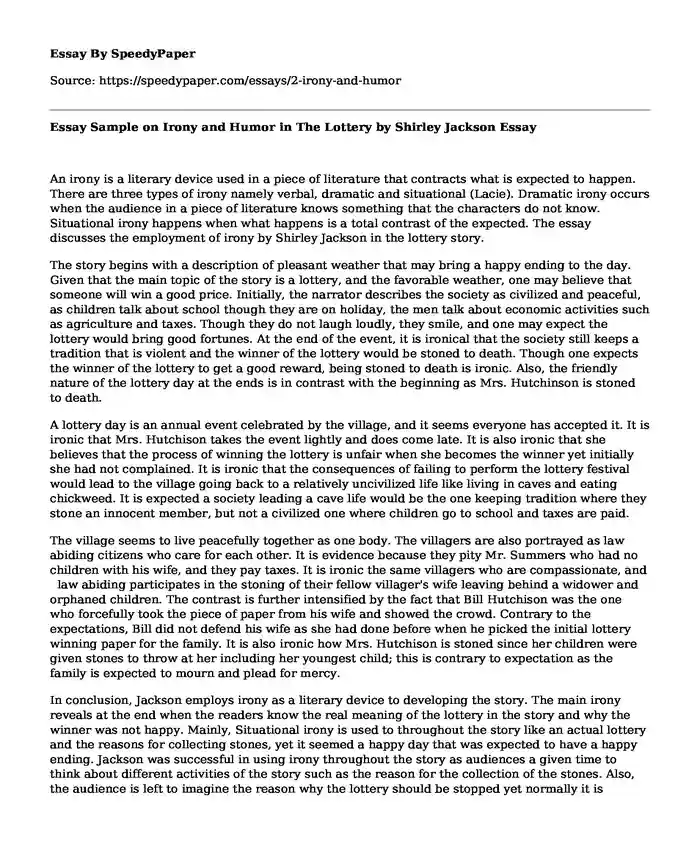
| Type of paper: | Essay |
| Categories: | Shirley Jackson American literature The Lottery |
| Pages: | 3 |
| Wordcount: | 694 words |
An irony is a literary device used in a piece of literature that contracts what is expected to happen. There are three types of irony namely verbal, dramatic and situational (Lacie). Dramatic irony occurs when the audience in a piece of literature knows something that the characters do not know. Situational irony happens when what happens is a total contrast of the expected. The essay discusses the employment of irony by Shirley Jackson in the lottery story.
The story begins with a description of pleasant weather that may bring a happy ending to the day. Given that the main topic of the story is a lottery, and the favorable weather, one may believe that someone will win a good price. Initially, the narrator describes the society as civilized and peaceful, as children talk about school though they are on holiday, the men talk about economic activities such as agriculture and taxes. Though they do not laugh loudly, they smile, and one may expect the lottery would bring good fortunes. At the end of the event, it is ironical that the society still keeps a tradition that is violent and the winner of the lottery would be stoned to death. Though one expects the winner of the lottery to get a good reward, being stoned to death is ironic. Also, the friendly nature of the lottery day at the ends is in contrast with the beginning as Mrs. Hutchinson is stoned to death.
A lottery day is an annual event celebrated by the village, and it seems everyone has accepted it. It is ironic that Mrs. Hutchison takes the event lightly and does come late. It is also ironic that she believes that the process of winning the lottery is unfair when she becomes the winner yet initially she had not complained. It is ironic that the consequences of failing to perform the lottery festival would lead to the village going back to a relatively uncivilized life like living in caves and eating chickweed. It is expected a society leading a cave life would be the one keeping tradition where they stone an innocent member, but not a civilized one where children go to school and taxes are paid.
The village seems to live peacefully together as one body. The villagers are also portrayed as law abiding citizens who care for each other. It is evidence because they pity Mr. Summers who had no children with his wife, and they pay taxes. It is ironic the same villagers who are compassionate, and law abiding participates in the stoning of their fellow villager's wife leaving behind a widower and orphaned children. The contrast is further intensified by the fact that Bill Hutchison was the one who forcefully took the piece of paper from his wife and showed the crowd. Contrary to the expectations, Bill did not defend his wife as she had done before when he picked the initial lottery winning paper for the family. It is also ironic how Mrs. Hutchison is stoned since her children were given stones to throw at her including her youngest child; this is contrary to expectation as the family is expected to mourn and plead for mercy.
In conclusion, Jackson employs irony as a literary device to developing the story. The main irony reveals at the end when the readers know the real meaning of the lottery in the story and why the winner was not happy. Mainly, Situational irony is used to throughout the story like an actual lottery and the reasons for collecting stones, yet it seemed a happy day that was expected to have a happy ending. Jackson was successful in using irony throughout the story as audiences a given time to think about different activities of the story such as the reason for the collection of the stones. Also, the audience is left to imagine the reason why the lottery should be stopped yet normally it is something that brings good fortunes.
Works cited
Jackson, Shirley. The Lottery And Other Stories. New York: Farrar, Straus and Giroux, 2005. Print.
Lacie, Christina. CAHSEE-English Language Arts. Hauppauge, N.Y.: Barron's Educational Series, 2008. Print.
Cite this page
Essay Sample on Irony and Humor in The Lottery by Shirley Jackson. (2017, Oct 25). Retrieved from https://speedypaper.com/essays/2-irony-and-humor
Request Removal
If you are the original author of this essay and no longer wish to have it published on the SpeedyPaper website, please click below to request its removal:
- Influence of Social Media Essay Sample
- Essay Sample with Publicity Campaign Proposal
- Analysis of Trevor Jones - Free Essay on Child Development
- Education Essay Example: Causes and Effects of Chris' Algebraic Problems
- Homework4
- Free Essa - Canadian Military Operations and Security
- Essay Example. Safety and Communication
Popular categories




